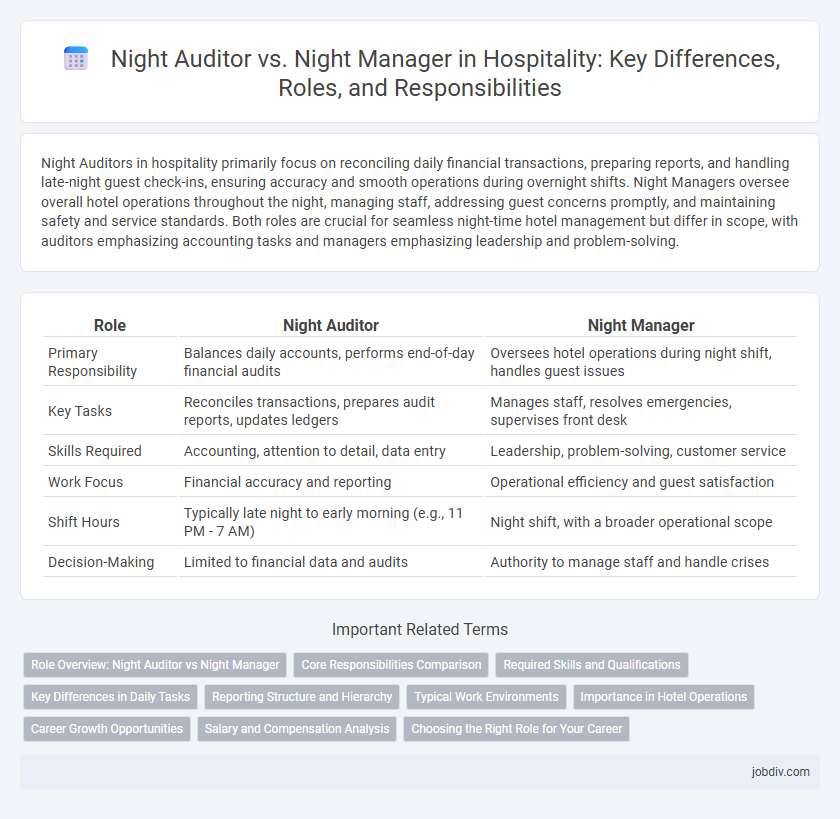Night Auditors in hospitality primarily focus on reconciling daily financial transactions, preparing reports, and handling late-night guest check-ins, ensuring accuracy and smooth operations during overnight shifts. Night Managers oversee overall hotel operations throughout the night, managing staff, addressing guest concerns promptly, and maintaining safety and service standards. Both roles are crucial for seamless night-time hotel management but differ in scope, with auditors emphasizing accounting tasks and managers emphasizing leadership and problem-solving.
Table of Comparison
| Role | Night Auditor | Night Manager |
|---|---|---|
| Primary Responsibility | Balances daily accounts, performs end-of-day financial audits | Oversees hotel operations during night shift, handles guest issues |
| Key Tasks | Reconciles transactions, prepares audit reports, updates ledgers | Manages staff, resolves emergencies, supervises front desk |
| Skills Required | Accounting, attention to detail, data entry | Leadership, problem-solving, customer service |
| Work Focus | Financial accuracy and reporting | Operational efficiency and guest satisfaction |
| Shift Hours | Typically late night to early morning (e.g., 11 PM - 7 AM) | Night shift, with a broader operational scope |
| Decision-Making | Limited to financial data and audits | Authority to manage staff and handle crises |
Role Overview: Night Auditor vs Night Manager
The Night Auditor primarily handles nightly financial reconciliations, ensuring all daily transactions are accurate and balanced while generating audit reports for management review. The Night Manager oversees overall hotel operations during the night shift, including guest services, staff supervision, and addressing any operational issues that arise. Both roles require strong problem-solving skills, but the Night Auditor emphasizes accounting accuracy, whereas the Night Manager focuses on operational leadership and guest satisfaction.
Core Responsibilities Comparison
Night auditors handle end-of-day financial reconciliation, ensuring accuracy in daily revenue reports, transaction records, and cash balances. Night managers oversee overall hotel operations during nighttime hours, including guest services, staff supervision, and addressing emergencies or maintenance issues. While auditors primarily focus on accounting accuracy, night managers ensure seamless guest experiences and operational efficiency overnight.
Required Skills and Qualifications
Night Auditors require strong analytical skills, proficiency in accounting software, and attention to detail to reconcile daily financial transactions and generate accurate reports. Night Managers must possess exceptional leadership abilities, crisis management skills, and customer service expertise to oversee nighttime hotel operations and ensure guest satisfaction. Both roles typically require experience in hospitality, familiarity with property management systems, and strong communication skills.
Key Differences in Daily Tasks
Night Auditors primarily focus on reconciling daily financial transactions, generating reports, and ensuring the accuracy of the hotel's accounting records during overnight shifts. Night Managers oversee overall hotel operations, handle guest service issues, supervise staff, and respond to emergencies to maintain smooth functioning throughout the night. The key difference lies in the Night Auditor's emphasis on financial accuracy and data, whereas the Night Manager prioritizes operational leadership and guest satisfaction.
Reporting Structure and Hierarchy
The Night Auditor typically reports to the Front Desk Manager or Assistant Night Manager and handles the daily financial reconciliation and audit reports. In contrast, the Night Manager holds a higher hierarchical position, overseeing hotel operations, staff coordination, and guest services during the night shift. The Night Manager ensures compliance with company policies, often supervising the Night Auditor and other night staff for efficient workflow and incident management.
Typical Work Environments
Night Auditors typically operate within hotels and resorts, focusing on front desk duties and financial reporting during overnight shifts. Night Managers also work in similar hospitality environments but have broader responsibilities, overseeing staff, guest services, and security throughout the night. Both roles require working in fast-paced, customer-centric settings with strong attention to detail and problem-solving skills.
Importance in Hotel Operations
The Night Auditor plays a crucial role in hotel operations by reconciling daily financial transactions and generating accurate reports that ensure fiscal integrity. The Night Manager oversees overnight staff, guest services, and emergency situations, maintaining smooth operational flow and high guest satisfaction during off-peak hours. Both positions are vital for maintaining hotel security, operational efficiency, and seamless continuity between day and night shifts.
Career Growth Opportunities
Night auditors gain valuable experience in financial reconciliation and guest service, setting a strong foundation for roles in hotel accounting or front office management. Night managers develop leadership skills by overseeing operations and staff during overnight shifts, positioning themselves for advancement into general management or departmental leadership roles. Both positions offer distinct pathways that can lead to higher-level executive roles within the hospitality industry.
Salary and Compensation Analysis
Night auditors typically earn between $30,000 and $40,000 annually, reflecting their primary role in financial reconciliation and front desk duties during overnight shifts. Night managers command higher salaries, ranging from $40,000 to $55,000, due to their expanded responsibilities including staff supervision, guest services, and operational decision-making. Compensation packages for night managers often include performance bonuses and managerial benefits, while night auditors usually receive standard hourly wages with limited incentives.
Choosing the Right Role for Your Career
Choosing between a Night Auditor and Night Manager role depends on your career goals in hospitality; Night Auditors focus on financial reconciliation and data accuracy during overnight shifts, while Night Managers oversee overall hotel operations and staff management after hours. Consider your strengths in accounting and detail-oriented tasks versus leadership and decision-making responsibilities to determine the best fit. Understanding these distinct roles helps align your skills with career advancement opportunities in hotel management or finance.
Night Auditor vs Night Manager Infographic

 jobdiv.com
jobdiv.com